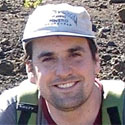Advisory Board and Editors Genomics

Brett Trost
Dr. Brett Trost is a Scientist in the Molecular Medicine Program at the Hospital for Sick Children, Toronto, Canada. He is a computational biologist with a particular interest in human genetics.

Thomas D Tullius
Professor of Chemistry, and Director of the Program in Bioinformatics, Boston University. Elected Fellow of the AAAS. Recipient of the Herbert A. Sober Award of the ASBMB. Research interests include developing new chemical probe methods (in particular, hydroxyl radical footprinting) for determining the structure of DNA, RNA, and DNA-protein complexes.

Jana M U'Ren
Assistant Professor, Department of Plant Pathology, Washington State University. PhD in Plant Pathology and Microbiology from The University of Arizona. Research focus on the ecology and evolution of fungal endophytes.

Ece Uzun
Dr. Ece Uzun is the Director of Clinical Bioinformatics at Lifespan Academic Medical Center and Assistant Professor at the Department of Pathology and Laboratory Medicine at Brown University Alpert Medical School. In her clinical work, Dr. Uzun focuses on building bioinformatics analysis pipelines, developing algorithms, tools and databases to aid in clinical variant detection and annotation. In addition to her clinical work, Dr. Uzun's research group develops novel algorithms to analyze big data and gene networks with a focus on complex disorders such as cancer and neurodevelopmental disorders.

Alfonso Valencia
Bioinformatician. Interested in biological networks, cancer biology, text mining, and personalised medicine.
ICREA professor. Director of the Life Sciences Department at Barcelona Supercomputing Center. Director of the Spanish Bioinformatics Institute (INB / ELIXIR-ES) and Executive Editor of Bioinformatics. Elected Fellow and President of the International Society for Comptuational Biology (ISCB). Member of EMBO.

Robert VanBuren
Assistant professor in the department of Horticulture at Michigan State University. Previously I was an NSF-NPGI postdoctoral associate at the Donald Danforth Plant Science Center. I completed my PhD at the University of Illinois under Ray Ming. My broad expertise are in the areas of plant genetics, genomics, evolution and molecular biology. I am interested in crop improvement and domestication, the evolution of sex chromosomes, and adaptive traits to arid environments such as the evolution of CAM photosynthesis and desiccation tolerance in resurrection plants.

Thiago M Venancio
Associate Professor (UENF; Brazil), 2010-present; Postdoctoral fellow at NCBI-NIH (USA), 2008-2010; PhD in Bioinformatics (University of Sao Paulo, Brazil), 2004-2008.
My lab focuses on genomic and transcriptomic studies of plants, fungi and bacteria. Our main goals involve the generation and analysis of big biological datasets using computational methods to understand key aspects of living organisms, such as: 1) the evolution of multidrug resistance genes in Fungi; 2) the evolutionary basis of gene essentiality in Bacteria and Archaea; 3) the transcriptional landscape and regulatory apparatus of land plants, particularly legumes.

Ranjit Vijayan
Dr. Ranjit Vijayan obtained his PhD in Life Sciences Interface/Biochemistry from the University of Oxford, UK, and his DipGrad in Management from the London School of Economics & Political Science, University of London, UK. In 2004 Dr Vijayan obtained his MSc in Computer Science from the University of Wales, Aberystwyth, UK, and prior to this his BEng in Electrical & Electronic Engineering, Nanyang Technological University, Singapore.
Dr. Vijayan's research interests include; molecular dynamics simulations of biological macromolecules, protein structure modeling, structure based drug discovery, genomics & transcriptomics, pharmacogenomics and high-performance computing.

Todd J Vision
I am Associate Professor of Biology, and Adjunct Professor of Information and Library Science, at the University of North Carolina at Chapel Hill. Much of my work has been on evolutionary genetics in plants, including ancient genome duplications, phylogenetic analysis of gene family diversification, and structural genomic variation in natural populations. I also have interests in computational biology, particularly the applications of ontologies for reasoning over large scale about phenotypic diversity data, and have been engaged in a number of projects to study and improve the infrastructure for scholarly communication, particularly open research data.

Khor Waiho
Researcher at the Institute of Tropical Aquaculture and Fisheries, Universiti Malaysia Terengganu. Dr. Khor Waiho obtained his Ph.D. in Aquaculture from Universiti Malaysia Terengganu (2016) and completed a 2-year postdoctoral (Biology, 2017-2019) at Shantou University, China. His current research focus includes the impact of climate change on crustacean growth and reproductive biology, population biology and fishery, and the aquaculture of economically important crustacean species.

Chris Wallace
I am a statistician who works with biological and genomic datasets to understand the mechanisms underlying human disease and identify possible treatments. My main focus is on autoimmune diseases.

Shibiao Wan
Dr. Shibiao Wan is currently an Assistant Professor in the Department of Genetics, Cell Biology and Anatomy, and the Co-Director for the Bioinformatics and Systems Biology (BISB) PhD Program at University of Nebraska Medical Center (UNMC). He is also an Assistant Professor (courtesy) in the Department of Biostatistics at UNMC.
With more than 15 years of experience in machine learning, bioinformatics, and computational biology, Dr. Wan has published >60 articles in top-tiered journals such as Genome Research, Nature Communications, Science Advances, Circulation Research, Briefings in Bioinformatics, and Bioinformatics. Dr. Wan is the Editor-in-Chief for Current Proteomics, and an Associate Editor/Academic Editor/Editorial Board Member for a series of prestigious journals such as Briefings in Functional Genomics, Heliyon, BMC Bioinformatics, International Journal of Microbiology, PeerJ Computer Science, BioMed Research International, and Computational and Mathematical Methods, and a guest associate editor for multiple high-impact journals.
He is a Scientific Program Committee (SPC) member for American Medical Informatics Association (AMIA) Annual Symposium and a Technical Program Committee (TPC) member for >20 machine learning related international conferences including IEEE ICTAI. Dr. Wan is also a reviewer for >70 prestigious journals including Nature Biotechnology, Nature Methods, Nature Communications, Nature Computational Science, Science Advances, Nucleic Acids Research, Advanced Science, Cancer Research, Genome Biology, and Genome Medicine. Dr. Wan has received a number of accolades including the Springer Nature Editor of Distinction Award in 2025 by Springer Nature, the New Investigator Award in 2024 by UNMC, the FIRST Award in 2023 by Nebraska EPSCoR, the Outstanding Young Alumni Award in 2022 by HK PolyU as well as the Global Peer Review Awards (top 1%) in “Cross-Field” and “Biology and Biochemistry” in 2019 by Clarivate. Dr. Wan is a member of AACR, AMIA, ISCB and ACM and an IEEE Senior Member.

